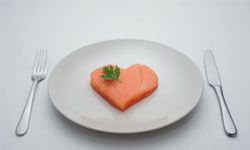Although national guidelines advise limiting your fat to 25% to 35% of your total calories, other experts, like Dean Ornish, M.D., recommend that you limit your fat intake to even lower amounts. His program recommends a very-low-fat vegetarian diet. In Dr. Ornish's programs there are two basic diets.
- The Reversal Diet. This diet is for those who already have heart disease. It has less than 10% of total calories from fat.
- The Prevention Diet. This diet is for those who do not have heart disease or high cholesterol. It allows for no more than 20% fat.
For both the Reversal Diet and the Prevention Diet, Dr. Ornish recommends that you take a multivitamin supplement that contains B12, iron, and trace minerals.
Advertisement
The Reversal Diet
Dr. Ornish's Reversal Diet is intended for people with heart disease who are determined to make drastic changes in order to lower their risk of heart attack and to reverse the effects of heart disease. The benefits may be worthwhile for people without heart disease as well.
The diet excludes all foods that are high in saturated fat and excludes all animal products except nonfat milk and yogurt and egg whites. It is important to keep track of fat grams if you eat commercially prepared products. You can do this by checking nutrition labels on the packages. The good news is that, when you stick with the foods allowed on the diet, you don't have many fat grams to keep track of. Since the foods on the diet only have negligible cholesterol, you don't need to track it daily.
The Reversal Diet is a modified lacto-ovo-vegetarian diet. A lacto-ovo-vegetarian diet is a a vegetarian diet that also allows you to eat dairy products and eggs. On the Reversal Diet, you may eat only nonfat milk and yogurt, but you may not eat egg yolks. When you follow this diet, your meals are made up of the following:
- whole grains, fruits, and vegetables
- plant-based protein, such as legumes, which are beans and peas
- egg whites
- nonfat milk and yogurt
- moderate salt and sugar, if desired
- less than 2 ounces of alcohol a day, if desired
- no oils
- no foods high in saturated fat, such as nuts, seeds, and avocados
- no caffeine
The Reversal Diet does not limit the amount of calories you eat. As long as you stick with the foods allowed on the diet, you can basically eat until you are satisfied. You may want to try grazing, which means you eat small amounts throughout the day instead of three large meals.
The diet does recommend that you eat 70% to 75% of your daily calories in carbohydrates from vegetables, beans, grains, and fruits. Another 15% to 20% of your diet should be protein from egg whites and small amounts of nonfat milk and yogurt as well as legumes and grains. The final 10% or less comes from polyunsaturated or monounsaturated fat. When you follow these amounts, you will greatly lower fat, cholesterol, and calories.
The Prevention Diet
If the following are true for you, then you are probably already eating in a manner that will prevent heart disease.
- I have not been diagnosed with heart disease.
- My total cholesterol is below 150 without taking medicine to lower it.
- I have no more than three times as much total cholesterol as HDL.
If the above are not true for you, then talk with your doctor about following the Prevention Diet to help lower your cholesterol.
Following a very-low-fat vegetarian diet is only one component of the intensive lifestyle changes that are recommended by experts such as Dr. Dean Ornish to reverse the effects of heart disease. The other components of an intensive lifestyle program include exercising every day, managing stress, stopping smoking, and getting support from others. To gain benefits similar to those realized by the people who participated in Dr. Ornish's studies, you must follow through in all of these areas.
Advertisement



